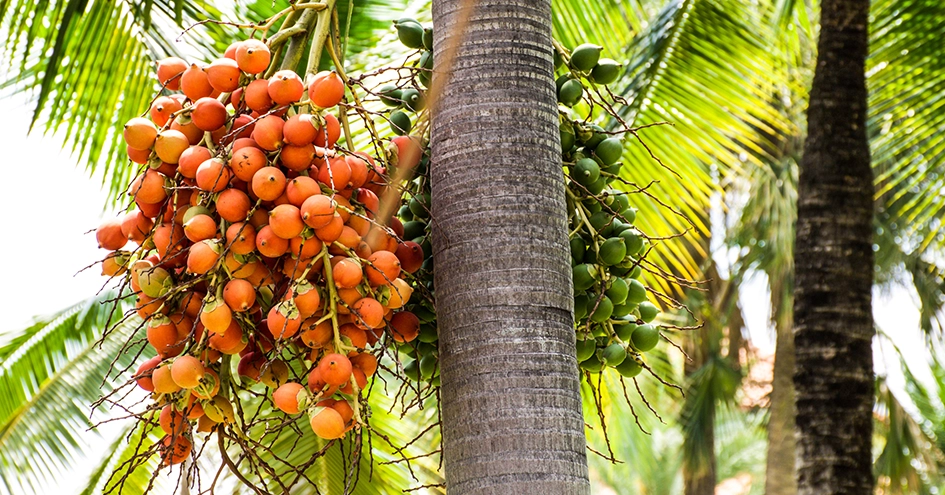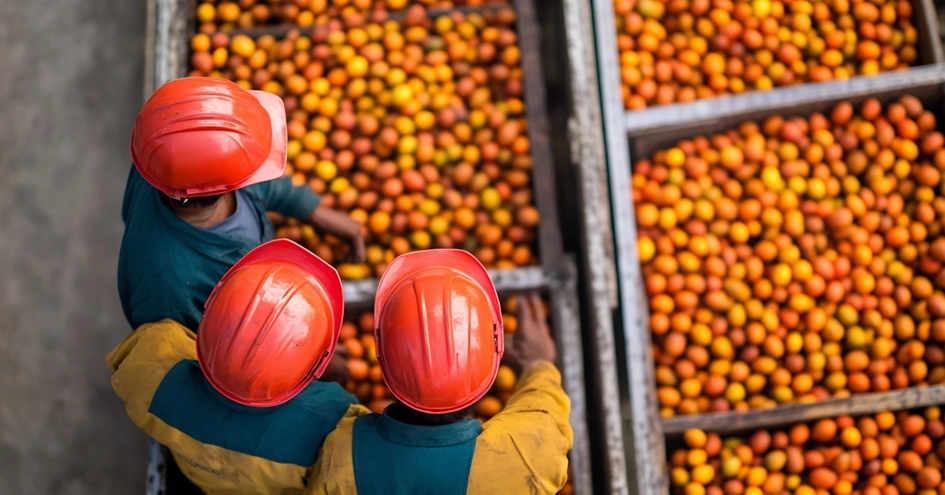Palm Oil
For the palm oil supply chain, we have adopted various measures and set objectives in line with the FPCoA roadmap. In the context of the first element of this roadmap, focusing on the own supply chain, the action plan aims to ensure greater transparency in the traceability of palm oil back to at least the country of origin. At the same time, we want to ensure that the production of this ingredient does not contribute to human rights violations, deforestation or the conversion of high conservation value (HCV) ecosystems, including high-carbon forests and peatland areas.
Our goal is to ensure the sustainable origin of the palm oil present in the products that all our banners sell, and, for this reason, we are committed to guaranteeing that, by 2025, the palm oil used in our Private Brand and perishable products is not associated with either deforestation or the conversion of HCV ecosystems. To meet this target, two cut-off dates have been set from which to ensure compliance with the criteria of no deforestation and no conversion:
- November 2005 – for primary forests or areas necessary for the protection of HCV areas;
- 15 November 2018 – for HCV and high-carbon forest areas.

In 2024, the use of palm oil in our Private Brand products increased, as it has in previous years. This trend was particularly evident in Ara, which uses around 90% of this ingredient in vegetable oils for cooking – a product thar is highly relevant to Colombian consumers.
As of 2024, 100% of the palm oil used in Private Brand and perishable products in Poland and Portugal was RSPO (Roundtable on Sustainable Palm Oil) certified – the vast majority is certified according to the “Mass Balance” and “Segregated” models. This certification guarantees the implementation of Free, Prior and Informed Consent (FPIC), a requirement of the RSPO Principles and Criteria to ensure that palm oil is produced without conflicts over legitimate land ownership and that it does not violate the rights of indigenous peoples and local communities. In Poland, the use of palm oil in Private Brand products has decreased due to the reformulation of the composition of some products.
RSPO Certification Schemes in Poland and Portugal (2024)
Although Colombia is among the world’s top five producers of palm oil, the rate of RSPO certification in the country is low. This reality, combined with our strategy of encouraging local purchases in the countries where we operate – with the aim of reducing carbon emissions associated with transport and promoting local development, as set out in our Sustainable Sourcing Policy – makes the goal of increasing the RSPO certification of palm oil produced in Colombia challenging.
Since 2021, Ara has been part of the “Acuerdo de Voluntades para la Deforestación Cero en la Cadena de Aceite de Palma en Colombia” (Voluntary Agreement for Zero Deforestation in the Colombian Palm Oil Chain) with the aim of guaranteeing that the palm oil used in Private Brand and perishable products does not contribute to deforestation. This agreement, promoted by the Colombian government, sets 2011 as the cut-off date after which deforestation will no longer be allowed and has the support of different civil society organisations – including RSPO, Proforest, the Tropical Forest Alliance and WWF. The initiative focuses on actions such as tracing palm oil back to the farm level, ensuring that it is not associated with deforestation. It also aims to ensure that imported palm oil has sustainability certification, such as RSPO.
Progress in 2024
In 2024, 100% of our palm oil consumption in Private Brand and perishable products reached 77,667 tonnes, an increase of 15% compared to 2023.
At Ara, 75% of the palm oil used in Private Brand and perishable products originated in Colombia (18 p.p. less than in 2023), of which around 66% was RSPO certified (54 p.p. more than in 2023). The use of palm oil from Colombia was lower, due to the increased materiality of Ecuador as an origin (it now accounts for 20% of consumption).
We were able to trace the origin of 95% of Colombia’s palm oil used in Private Brand and perishable products back to the area of the farm where it was produced – an increase of 4 p.p. compared to 2023. We thus confirmed that the palm oil came from the Departments of Norte de Santander, Cesar, Magdalena, Meta and Casanare, located in three of the country’s four producing areas (Central Zone, Eastern Zone and Northern Zone) and from 25 of the 70 processing plants operating in Colombia.
According to official data from 2021, only 0.75%1 of the deforestation identified in Colombia was associated with palm oil. This fact, along with the high levels of traceability, the growing RSPO certification and the low rate of deforestation associated with palm oil in Colombia, validates our DCF strategy for the use of this commodity in the country.
The palm oil used in Ara’s Private Brand and perishable products that did not have its origin in Colombia accounted for 25% of the total, of which 59% was RSPO certified (39 p.p. less than in 2023). Ara’s main suppliers were unable to source RSPO certified palm oil for all volumes from non-Colombian origins.
In 2025 we will work together with suppliers to increase the RSPO certification levels of imported palm oil, with a commitment to ensure that it is not associated with deforestation or the conversion of HCV ecosystems.
Assuming that:
- for countries considered to be at risk of deforestation and conversion, the physical certification schemes up to the “Segregated” level are considered DCF;
- in Colombia:
- 9% of our consumption is at risk of deforestation (we took a conservative approach as it was not possible to map down to the farm level);
- we applied the deforestation associated with palm oil (0.75%), identified by Colombian public bodies, to 95% of our consumption which was traced back to the area of the farm where it was produced;
we can assume that 56% (43,378 tonnes) of our total palm oil consumption in 2024 was free from deforestation> and conversion of HCV ecosystems – 10% (4,331 tonnes) came from DCF physical certification schemes and 90% (39,047 tonnes) through DCF traceability and verification. The volume considered to be in the process of becoming DCF corresponds to 44% (34,289 tonnes).
These figures are based on the new DCF calculation method developed by the FPCoA for palm oil, applicable from 2024. This method considers physical certification schemes up to the “Segregated” level as DCF-compliant.
However, if we consider palm oil volumes with RSPO certification up to the “Mass Balance” level, we can see that 89% of our total palm oil consumption in 2024 (69,029 tonnes) would be free from deforestation and conversion of HCV ecosystems. The volume considered to be in progress for DCF would correspond to 11% (8,638 tonnes).
We have included the “Mass Balance” physical certification scheme in the DCF calculation to acknowledge the efforts of our Private Brand and perishable suppliers. Their commitment in fighting deforestation and conversion associated with the palm supply chain, which involves additional financial and operational costs, contribute to a more sustainable palm oil production.

We will continue to work to increase the traceability of palm oil volumes, particularly – and where possible – down to plantation level, so that we can verify that it has not been responsible for deforestation or conversion of HCV ecosystem.
In 2024 we achieved an average score of 8.2 points on the RSPO’s Shared Responsibility Scorecard, which represents an improvement of 0.8 points compared to 2023 – and a performance above the average for the retail sector (4.6). The RSPO’s assessment considers five dimensions: transparency and legality, environment, social issues, sourcing and fulfilment of the certification target.
Our progress on palm oil is detailed and available for consultation in our responses to the Annual Communication on Progress from the Roundtable on Sustainable Palm Oil.
Engagement with suppliers and traders
As part of Element 2 of the roadmap – engagement with suppliers and traders – we remain committed to transparently communicate our expectations and initiatives to all those involved in our supply chain.
In 2024 we continued the work we began in 2014 to map the presence of palm oil in Private Brand and perishable products. To do this, we send annual surveys to direct suppliers to collect information on the type of certification of the commodity used and the origin of primary production (at least up to national level).
We regularly communicate our commitments, progress and policies for the preservation of forests and evaluate suppliers’ policies and actions to fight deforestation. The goal is to increase the traceability of the supply chain and mobilise Private Brand and perishable suppliers to adopt concrete commitments and initiatives in their operations, in line with the guidelines of the FPCoA roadmap.
In 2024 we reinforced this work with the main suppliers, who accounted for more than 80% of our palm oil consumption. We identified their main sources of supply, importers, refineries where palm is processed and the volume of certified raw materials (see list here). We were able to identify the traders upstream of our direct suppliers who are responsible for more than 70% of our palm oil consumption from countries at risk of deforestation and conversion. Of the indirect suppliers identified, 6 are traders (Bunge, AAK, Olenex, Croda, BASF, Fuji Oi), and account for 10% of our palm oil consumption in 2024. These traders were assessed by CDP - Disclosure Insight Action (formerly the Carbon Disclosure Project), and were rated A- (1%), B (50%) and C (49%) in the Forests programme.
This data shows the complexity of supply chain traceability for retailers – palm oil is often present in compound ingredients, which significantly increases the number of indirect suppliers.
By the end of 2025, and together with our main direct suppliers, we intend to increase traceability at the level of the traders involved in the supply chain and disclose information on their performance in fighting deforestation and conversion of natural ecosystems. We will also continue to involve the most relevant direct suppliers in interactions and workshops, in order to identify their commitments to fight deforestation and conversion and raise awareness about their alignment with the objectives we have set for our palm oil supply chain.
In 2024, we continued to play an active role in multi-stakeholder initiatives at national level:
- in Poland, through Biedronka’s participation in the Polish Coalition for Sustainable Palm Oil (PKZOP), the goal of certifying 100% of the palm oil used was achieved (e.g. RSPO);
- in Colombia, through Ara, we continue to work towards increasing the certification of palm oil from non-Colombian sources, as defined in the “Voluntary Agreement for Zero Deforestation in the Palm Chain in Colombia”.
1 Data disclosed in the analysis of the level of deforestation linked to palm oil production by IDEAM (2023) – Instituto de Hidrología Meterelogía y Estudios Ambientales and the Colombian Ministry of the Environment.
